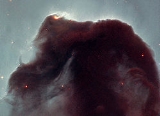
Horsehead Nebula
Encyclopedia
The Horsehead Nebula is a dark nebula
in the constellation Orion
. The nebula is located just to the south of the star Alnitak, which is farthest east on Orion's Belt, and is part of the much larger Orion Molecular Cloud Complex
. The Horsehead Nebula is approximately 1500 light years from Earth. It is one of the most identifiable nebulae because of the shape of its swirling cloud of dark dust and gases, which is similar to that of a horse
's head when viewed from Earth. The shape was first noticed in 1888 by Williamina Fleming
on photographic plate B2312 taken at the Harvard College
Observatory.
The red glow originates from hydrogen
gas predominantly behind the nebula, ionized by the nearby bright star Sigma Orionis
. The darkness of the Horsehead is caused mostly by thick dust, although the lower part of the Horsehead's neck casts a shadow to the left. Streams of gas leaving the nebula are funneled by a strong magnetic field
. Bright spots in the Horsehead Nebula's base are young stars just in the process of forming.
Dark nebula
A dark nebula is a type of interstellar cloud that is so dense that it obscures the light from the background emission or reflection nebula or that it blocks out background stars . The extinction of the light is caused by interstellar dust grains located in the coldest, densest parts of larger...
in the constellation Orion
Orion (constellation)
Orion, often referred to as The Hunter, is a prominent constellation located on the celestial equator and visible throughout the world. It is one of the most conspicuous, and most recognizable constellations in the night sky...
. The nebula is located just to the south of the star Alnitak, which is farthest east on Orion's Belt, and is part of the much larger Orion Molecular Cloud Complex
Orion Molecular Cloud Complex
The Orion Molecular Cloud Complex refers to a large group of bright nebula, dark clouds, and young stars located in the constellation of Orion. The cloud itself is between 1,500 and 1,600 light-years away and is hundreds of light-years across...
. The Horsehead Nebula is approximately 1500 light years from Earth. It is one of the most identifiable nebulae because of the shape of its swirling cloud of dark dust and gases, which is similar to that of a horse
Horse
The horse is one of two extant subspecies of Equus ferus, or the wild horse. It is a single-hooved mammal belonging to the taxonomic family Equidae. The horse has evolved over the past 45 to 55 million years from a small multi-toed creature into the large, single-toed animal of today...
's head when viewed from Earth. The shape was first noticed in 1888 by Williamina Fleming
Williamina Fleming
-External links:* * * * from the Astronomical Society of the Pacific- Obituaries :*...
on photographic plate B2312 taken at the Harvard College
Harvard College
Harvard College, in Cambridge, Massachusetts, is one of two schools within Harvard University granting undergraduate degrees...
Observatory.
The red glow originates from hydrogen
Hydrogen
Hydrogen is the chemical element with atomic number 1. It is represented by the symbol H. With an average atomic weight of , hydrogen is the lightest and most abundant chemical element, constituting roughly 75% of the Universe's chemical elemental mass. Stars in the main sequence are mainly...
gas predominantly behind the nebula, ionized by the nearby bright star Sigma Orionis
Sigma Orionis
Sigma Orionis or Sigma Ori is a five-star system in the constellation Orion. It is approximately 1,150 light years from Earth....
. The darkness of the Horsehead is caused mostly by thick dust, although the lower part of the Horsehead's neck casts a shadow to the left. Streams of gas leaving the nebula are funneled by a strong magnetic field
Magnetic field
A magnetic field is a mathematical description of the magnetic influence of electric currents and magnetic materials. The magnetic field at any given point is specified by both a direction and a magnitude ; as such it is a vector field.Technically, a magnetic field is a pseudo vector;...
. Bright spots in the Horsehead Nebula's base are young stars just in the process of forming.
External links
- The Horsehead Nebula @ The Electronic Sky
- Hubble Observes the Horsehead Nebula
- The discovery of early photographs of the Horsehead nebula, by Waldee and Hazen
- The Horsehead Nebula in the 19th Century, by Waldee
- Detection of new nebulae by photography, by Pickering
- Horsehead Nebula at ESA/Hubble
- The Horsehead Nebula at the Astro-Photography site of Mr. T. Yoshida.
- The Horsehead-Nebula and neighboring structures in a classical view
- The Horsehead Nebula on interactive astro-photography survey at Wikisky.org
- Photograph of M. Weigand

